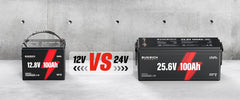
12V vs 24V Battery Systems: What's the Difference?
, 6 Tiempo mínimo de lectura


, 6 Tiempo mínimo de lectura
Batteries are a crucial component of our everyday life. From powering cell phones to family homes, batteries keep our modern lives running smoothly. Most of the time, we don’t think about the battery specs on our wrist or in our pocket, which is all good. However, when you have an RV, boat, or even an off-grid cabin, understanding your battery’s technical specs is critical to your systems’ longevity.
One of the biggest factors to understand and consider is the voltage of the battery as this can affect your entire system setup. The two most common voltages are 12V and 24V, and each has its benefits and use cases when it comes to powering a system.
Battery voltage is an important factor in your overall electrical system. Every electrical device requires a specific voltage, and choosing the right voltage can impact your system and your device’s performance and overall lifespan. The most commonly used voltage systems are the 12V and 24V systems.
12V Battery systems are some of the most commonly used systems for smaller vehicles and devices such as RVs, boats, and other low-power applications. With 12 volts, a system can easily run up to 3000W of power. You’ll find that many commercial-grade and personal electrical systems are built to be used with 12V batteries due to the ease and popularity of the systems and how easy it is to source the materials for the systems.
24V battery systems are used for higher power needs, like industrial applications, larger solar systems, and large RVs. This is because 24V systems offer greater efficiency and are ideal for applications that require long-distance transmissions with a higher power output.
The difference between the two systems means there is a better choice when developing your overall battery bank. For example, if you’re simply trying to use a few small appliances, a 12V system may be a better choice, whereas a whole off-grid system would better be served with a 24V system.
|
|
12V Systems |
24V Systems |
|
Voltage |
● Uses more current for the same amount of power |
● Uses less current for the same amount of power |
|
System Efficiency |
● Better for low-power applications ● Needs fewer and smaller cables and wires ● Reduces wiring cost and energy loss |
● Better for higher power applications ● Better at transmitting power over longer distances ● Needs bigger and longer wires |
|
Battery Configuration |
● Can be wired in parallel for 12V systems ● Can be wired in series to create a 24V system |
● Requires fewer batteries to deliver the same energy output |
|
12V Battery Applications: |
24V Battery Applications: |
|
● RVs, ● Boats, ● Small solar systems |
● Industrial equipment ● Large RVs ● Off-grid power systems |
In boats and electric vehicles, 24V battery systems offer better performance with smaller cables and reduced heat loss. For anything smaller than an average-sized boat, it’s highly recommended you go with a 12V battery system.
As with all things in life, there are pros and cons to a 12V and 24V system. Understanding these benefits and fallbacks will help you make better choices for your battery systems.
|
12V Battery System Pros |
24V Battery System Pros |
|
● Lower cost, simpler installation ● Best for small electronics and low-power applications |
● More efficient for high-power needs ● Less cable loss and heat generation, lower wiring costs ● Higher overall performance, especially in solar systems and off-grid power setups |
|
12V System Cons: |
24V System Cons: |
|
● Less efficient in long-distance power transmission and high-power applications
|
● More complex setup ● Expensive ● Requires a higher initial cost
|
When all is said and done, a 12V battery system and a 24V battery system have their unique advantages and disadvantages. When choosing which battery system is right for you, consider your power needs, transmission distance, and the type of equipment you have.
If you have a van or a small solar system, then a 12V battery is ideal in terms of price and power. However, if you have a large RV, are living off-grid, or need to power something on a commercial scale, then a 24V battery is the way to go as they can provide better performance and efficiency over longer distances.
Don’t forget to consider your initial cost budget, long-term budget, and whether or not you intend to expand your system. Sunrich Energy has many battery options available for purchase. Contact us today to get help on picking the right system for you.



